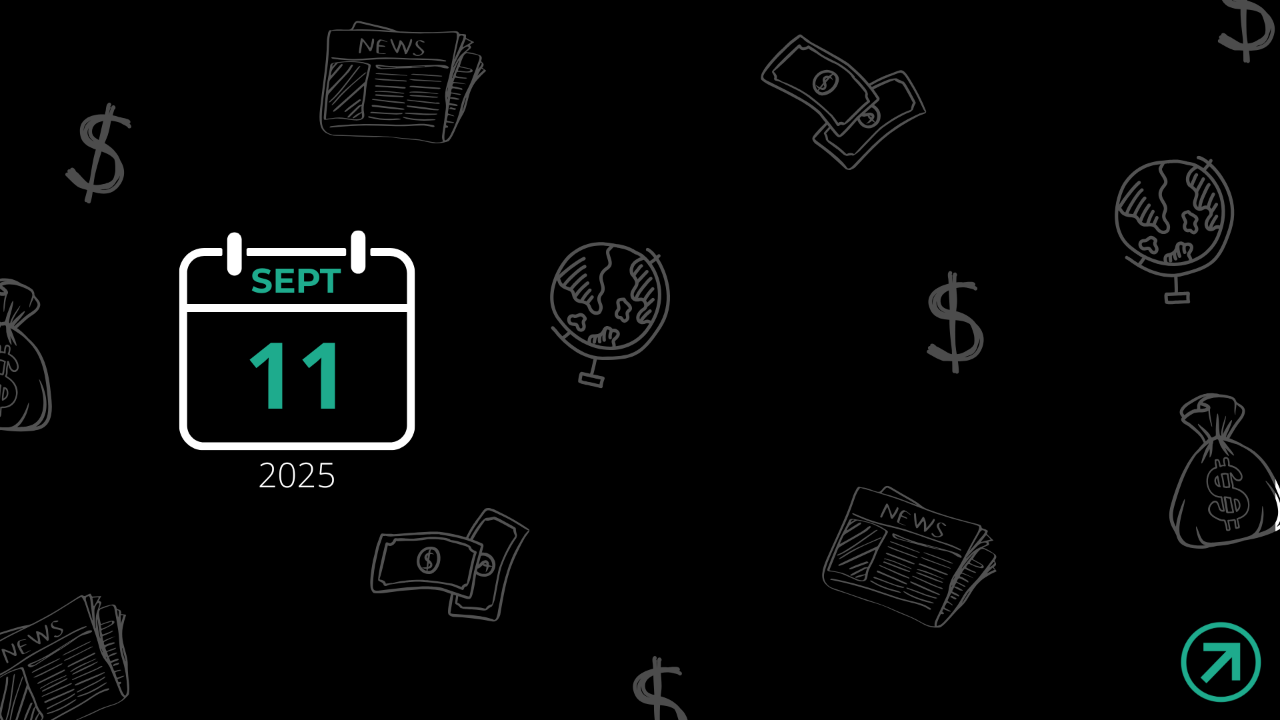Financial and Economic News for September 11, 2025

It’s been a busy week for the markets, and the big theme is simple: everyone’s watching the Fed. Stocks are rallying, mortgage rates are dropping, job numbers just got a major reality check, and Oracle made a monster bet on AI. Let’s break it down.
The Fed, Inflation, and Why Wall Street’s Excited
Investors are almost certain the Fed will cut interest rates next week. Why? Two big numbers came out:
-
Inflation in August ticked up to 2.9% from July’s 2.7% (Still above the Fed’s 2% goal, but not a shocker)
-
Jobless claims jumped to the highest level since 2021, a clear sign the labor market is softening.
That’s enough to give Jerome Powell and team “cover” to finally ease up on rates. Traders are betting on a quarter-point cut, and markets loved it. The Dow is pushing toward 46,000 for the first time ever, and both the S&P 500 and Nasdaq are flirting with records.
But here’s the catch: a rate cut isn’t just “yay, stocks go up.” It’s also the Fed quietly saying, “Yeah, the economy isn’t as strong as it looks.” If you’re running a business, this is when you tighten up cash flow and make sure you’re not overextending yourself.
The Jobs Report Just Got a Big Revision
This one’s wild. The Bureau of Labor Statistics went back and revised U.S. job growth for the year ending in March, and it turns out we overcounted by 911,000 jobs.
That means instead of adding about 147,000 jobs a month, the economy was only creating closer to 70,000. Almost cut in half. Industries like retail, hospitality, and manufacturing all saw weaker growth than originally reported.
No wonder hiring has felt slow and layoffs have been creeping up. The data we were all looking at was too rosy. Powell even hinted last month this was coming, so the Fed clearly knew the jobs boom wasn’t real.
The lesson? If the official stats can be that far off, imagine how easy it is for a business owner to misread their own numbers. You can’t fly blind and expect to stay in control.
Mortgage Rates Finally Dip, But Housing’s Still Tough
Mortgage rates just dropped to 6.35%, the lowest level in nearly a year. That’s down from over 7% in January. For buyers, that matters. A $3,000 monthly budget now covers a $466,000 home instead of $442,500.
So is housing suddenly affordable again? Not really. Prices are still near record highs, property taxes and insurance are climbing, and with job growth slowing, a lot of buyers are still on the sidelines.
That said, demand is picking up. Mortgage applications are up 22% year-over-year, and some builders are offering creative incentives like sub-5% mortgage deals. The window-shopping has started again.
The big picture? Analysts don’t see housing affordability getting back to 2018 levels until around 2029. So for families, it’s still a waiting game. And for anyone in housing-related businesses, expect a slow, uneven recovery, not a sudden boom.
Oracle Makes a $300 Billion Bet on OpenAI
Here’s one of the biggest tech deals in history: Oracle signed a $300 billion contract with OpenAI to provide cloud services over the next five years.
To give you a sense of scale, that deal requires enough power to run nearly two Hoover Dams. Oracle stock shot up, and Larry Ellison’s net worth climbed close to $400 billion.
But here’s the risk: OpenAI only makes about $10 billion a year right now. To pay Oracle, it’ll need closer to $60 billion annually. That’s a massive gap. If the AI boom slows or competitors take market share, this deal could turn into a headache for Oracle.
It’s the classic big-bet story: high upside, high risk.
Saudi Arabia Bets on Solar
Saudi Arabia is building massive solar farms and battery projects, aiming for half its electricity to come from renewables by 2030.
Why would the biggest oil exporter in the world do this? Strategy. Right now, they burn about a third of their oil just to generate power at home, which costs them about $20 billion a year in lost exports. By switching to solar, they can sell more oil abroad and fuel their own industries with cheap power.
It’s less about “going green” and more about deploying resources where they create the most value. Something every smart business owner should be thinking about.
The Bottom Line
This week’s financial news boils down to a few themes:
-
The Fed is likely cutting rates, which is great for markets but a red flag for growth
-
The jobs market wasn’t as strong as we thought; revisions show nearly a million fewer jobs
-
Housing got a little relief with lower mortgage rates, but affordability is still broken
-
Oracle’s monster AI deal could reshape tech, or backfire
-
Saudi Arabia shows how redeploying resources can unlock massive value
The thread running through it all? The numbers don’t always tell the full story — whether it’s the Fed misjudging jobs or buyers hoping a small rate cut will suddenly make housing affordable. The winners will be the ones paying attention to what’s underneath the headlines.


